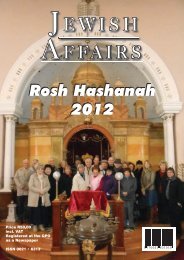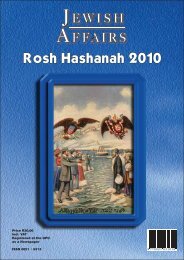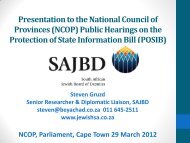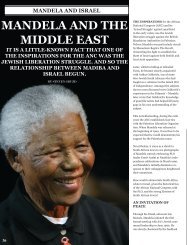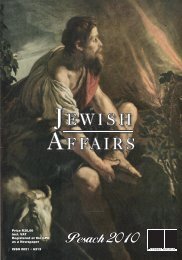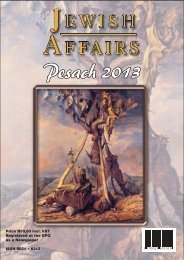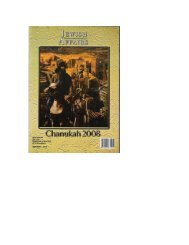Rosh Hashanah 2009 - South African Jewish Board of Deputies
Rosh Hashanah 2009 - South African Jewish Board of Deputies
Rosh Hashanah 2009 - South African Jewish Board of Deputies
- No tags were found...
You also want an ePaper? Increase the reach of your titles
YUMPU automatically turns print PDFs into web optimized ePapers that Google loves.
JEWISH AFFAIRS ROSH HASHANAH <strong>2009</strong>JACK BLOOM –LIFE AND TIMES OF A WORKING POLITICIAN*Jack Bloom has been his party’s spokesperson in the Gauteng Legislature on Health since 1994, firstfor the Democratic Party (DP) and thereafter for the Democratic Alliance (DA). He was Chief Whip untilassuming the role <strong>of</strong> Leader <strong>of</strong> the Opposition in December 2007, a position he held until April <strong>2009</strong>.Today, he continues to hold the Health portfolio and is also the DA’s spokesperson on issues pertainingto corruption.This interview was conducted by the editor on 13 May <strong>2009</strong>.When you were elected as City Councillor for thethen Democratic Party in 1991, you became just one<strong>of</strong> many <strong>Jewish</strong> politicians then holding local ornational positions. Today, only two <strong>Jewish</strong> members<strong>of</strong> the National Assembly remain while you are theonly <strong>Jewish</strong> Member <strong>of</strong> the Provincial Legislature(MPL) in all nine provinces. How do you explain thisdramatic falling <strong>of</strong>f <strong>of</strong> <strong>Jewish</strong> involvement in politicsat all levels?Jews certainly used to be very active inJohannesburg local politics – every second or thirdmayor was <strong>Jewish</strong>. There remains a fair number <strong>of</strong><strong>Jewish</strong> local councillors in Johannesburg – ShirleyAncer, Ray Wolder, John Mendelson, DarrenBergman, Allen Fuchs and Marcel Bloom-Ravid forthe DA, Sol Cowan and Joy Coplan in the ANC andMervyn Cirota for the Independent Democrats. Sothere is still a presence at the local level.It’s a slippery path to get from provincialgovernment to Parliament. There’s not that manyseats and you need to work your way up. Funnilyenough, there are more opportunities now, becausethere are more seats compared to in the past. In theold Johannesburg, for example, there were 51 seatsin total. Today the DA, even as the Opposition, hassome sixty seats.I wouldn’t say there’s a lack <strong>of</strong> civic action, butit’s not the kind <strong>of</strong> action that is channelled intopolitics. If you want to see massive civic activism byJews it’s in the Glenhazel Active Patrol, somethingpioneered by the CSO and Chief Rabbi. There’salmost a withdrawal from <strong>of</strong>ficial institutions, and aprevailing attitude that we’ll look after ourselvesbecause the State isn’t looking after us. That’s reallywhat GAP and its allied bodies are all about.So far as creating alternatives outside the <strong>of</strong>ficialstructures goes, we also see initiatives like Hatzollah(Medical Rescue) and the fact that most <strong>Jewish</strong>children now attend private schools.Absolutely. So there’s been an opting out <strong>of</strong>public education, health and security, and you can’tget more basic than that. There has certainly been aninward turn, which is part <strong>of</strong> the broader phenomenon<strong>of</strong> white withdrawal from active politics. We find incertain areas people vote massively for us at electiontime but don’t want to join the party and becomeinvolved. We also see that our most active branchesare in the townships. Politics is very real to theresidents there - they have grievances they wantaddressed. There are obviously grievances in the[mainly white] suburbs as well, but residents theredon’t see redress through politics but through selfhelpactivities. It’s really a failure <strong>of</strong> institutions –you shouldn’t, after all, have to set up private security,because it is the primary duty <strong>of</strong> the State to protectits citizens. So while there’s a lot <strong>of</strong> talent out there,we don’t see it being channelled into political actions.The DA won just under 17% <strong>of</strong> the national votein the last elections, increasing its overall support bynearly 4%, and with at least a third <strong>of</strong> supportcoming from non-white voters. How do you accountfor these gains?The proportion <strong>of</strong> non-white support was probablyeven higher than that, actually. It’s primarilyminorities who support the DA now. The ANC hasevidently lost virtually all its white support. Therewas a visible white support in 1994, largely <strong>Jewish</strong>in fact. It was all part <strong>of</strong> the Mandela enthusiasm <strong>of</strong>4



